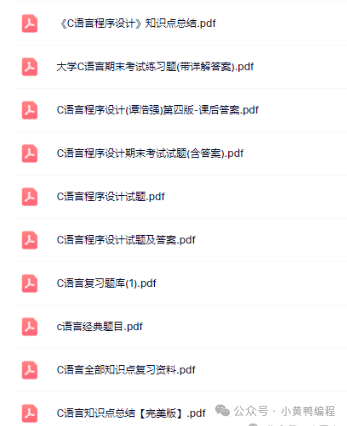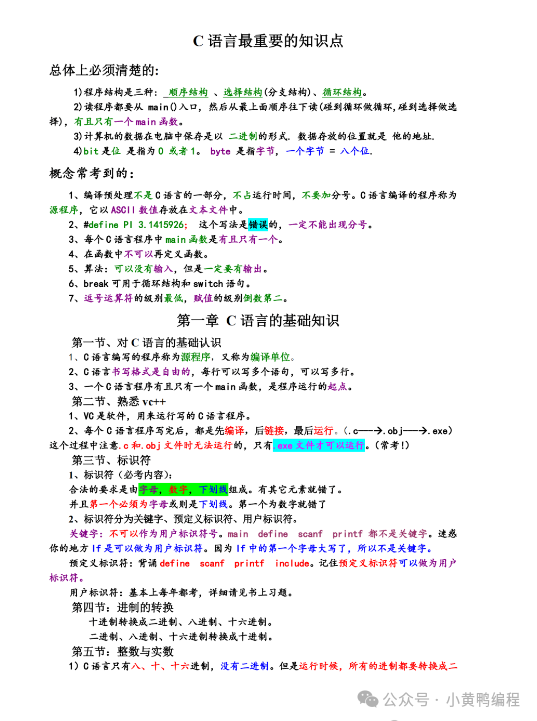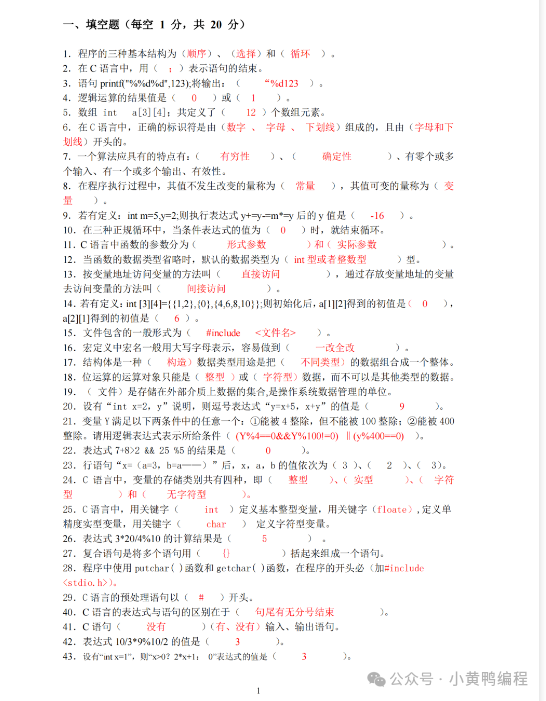C Language Essentials Summary and Practice Questions
The end of the semester is approaching! Have you started digging into your textbooks lately? No worries, if you feel lost in your review, this article is here to save the day! Today, we have specially organized a summary of classic C language knowledge points, along with a set of frequently asked exam questions to help you understand quickly. Please check out this “lifesaver document” immediately; I sincerely don’t want you to miss it! Grab it at this critical moment, and you can handle even the toughest finals! (Manual heart gesture)

Overview of High-Frequency Knowledge Points in C Language Finals
Before we get to the main points, don’t panic, just listen to me: Reviewing C language is really not that hard! We have summarized the most important and basic content from the syllabus to save you a lot of time flipping through books. Come and sort out how much of the following knowledge points you can master.
1. Basic Concepts
-
1. Meaning of Source Code: Programs written in C language are called source code, also known as “compilation units”. They do not run directly and must be compiled first!
-
2. Program Structure:
-
• There are no restrictions on the format of writing in C language! You can write across multiple lines or stack multiple statements in one line.
-
• But note: Every C program must have one and only one main function
main(). It is the entry point for running the C program!
2. Tools and Running Process
Familiarity with tools is also crucial!
-
• Generally, we use the VC++ environment (similar ones can also be used), mainly for “writing programs and debugging programs”.
-
• The running process of a piece of C code is first compiled (.c → .obj), then linked (.obj → .exe). But remember, only the
.exefile can actually run, don’t confuse them!

3. Identifiers and Keywords (Very Important!)
-
1. What is an Identifier?
-
• Must consist of letters, numbers, and underscores, and the first character must be a letter or underscore, not a number!
-
• Used in the program to represent variable and function names, the naming requirements for valid identifiers are:
2. Categories of Identifiers:
-
• Keywords: System-defined, such as
int,return, which you cannot use for other purposes. -
• Predefined Identifiers: Although they can be used as variable names, it is best not to change them, like
printf, etc. -
• User-defined Identifiers: Freely named by us, but don’t clash with keywords, or it will cause errors.
3. Confusing Exam Points: Remember that case matters! For example, if is a keyword, but If (with a capital letter) can be used as a variable name.
4. Classic Algorithms and Base Conversion
Numbers are essential in C language! Especially base conversion, this part of the questions can really make you feel lost.
-
• Decimal to Binary, Octal, Hexadecimal.
-
• Conversely, convert these binary numbers back to decimal. Remember the mnemonic: If you memorize the conversion methods between bases, you’ll secure half of the exam!
Practice on Key Exam Question Types
The following question bank section consists of high-frequency, simple yet score-boosting classic questions. Practice them before the exam, and you can secure at least 10 points. Here are a few to showcase; you can check the answers!

Q1: Determine whether the following identifier names are valid and explain why:
-
1.
_abc123 -
2.
1num -
3.
float1
Q2: What is the decimal equivalent of the binary number 1011?
Don’t panic when reviewing C language, first solidify your basics, carefully go through the question bank and notes twice, and the rest is up to your performance in the exam! Friends, keep it up; graduation is not far away!! 💪
